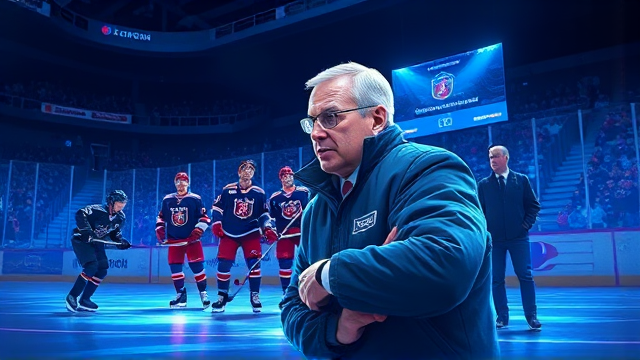Guberniev on SKA: Firing Larionov Wouldn't Be a Surprise
The once-mighty SKA St. Petersburg, a club with the financial muscle and historical ambition to dominate the Kontinental Hockey League, finds itself in a precarious and frankly bewildering position, languishing in eighth place in the Western Conference after a paltry return of 13 points from 13 games, a statistic made all the more damning by a current five-game losing streak that has fans and pundits alike sounding the alarm.This stark underperformance has thrust the spotlight directly onto the head coach, the legendary Hall-of-Famer Igor Larionov, whose cerebral approach to the game, dubbed 'The Professor's' style, now faces its most severe test. The situation has prompted prominent Match TV commentator Dmitry Guberniev to voice a sentiment echoing through the hockey world, stating plainly that a dismissal of Larionov 'wouldn't be a surprise,' a chillingly pragmatic assessment that underscores the cutthroat nature of professional sports where legacy often bows to immediate results.Guberniev further introduced a fascinating and contentious counter-factual, musing that the prior departure of Roman Rotenberg from the coaching helm might have been a strategic misstep, suggesting that while Rotenberg's tenure had its own struggles, the current level of difficulty the team is experiencing paints his leadership in a different light and expressing confidence that Roman Borisovich still has a future as a head coach somewhere in the league. This isn't merely a slump; it's a full-blown systemic crisis for a SKA roster that, on paper, should be contending for the Gagarin Cup, not scrambling for a playoff berth.The parallels to a top-tier European football club like FC Barcelona during a transitional period are striking, where the weight of expectation collides with a disjointed on-ice product, much like when Barça’s tiki-taka philosophy seems to falter without the exact right personnel, leaving fans to debate whether the problem is the system or the players executing it. Larionov’s philosophy, emphasizing puck possession, creative passing, and a fluid offensive structure, is hockey’s equivalent of the beautiful game, but it requires absolute buy-in and impeccable execution from every player on the ice; when it fails, it can look naive and vulnerable to more direct, physically imposing opponents.One must ask whether the SKA management, in their pursuit of a certain aesthetic, have provided Larionov with a squad suited to his vision, or if there's a fundamental mismatch between the coach's ideals and the players' capabilities, a classic front-office failure reminiscent of when a football club signs a powerhouse striker only to hire a manager who prefers a false-nine system. The shadow of Rotenberg, who remains a powerful figure within the club's hierarchy, looms large over this entire discourse, creating a potentially destabilizing dynamic where the former coach is seen as a viable alternative waiting in the wings, a scenario that rarely ends well for the incumbent.The financial implications for a club of SKA's stature are enormous; early playoff exits or, heaven forbid, missing the postseason altogether, represent not just a sporting failure but a significant commercial blow, affecting everything from sponsorship deals to merchandise sales and arena revenue. Historically, KHL teams, especially those with deep-pocketed owners, have not been known for their patience, and the axe tends to fall quickly when a team underperforms its budget, making Larionov’s position increasingly untenable with each successive loss.Guberniev’s personal inclination to grant Larionov more time is a noble one, reflecting a belief in long-term project building over reactive panic, but he is astute enough to recognize the prevailing winds in the KHL, where the coaching carousel spins with dizzying speed. The broader context here is the intense pressure within Russian hockey for its flagship clubs to perform, serving as a symbol of national sporting prowess, which adds another layer of scrutiny that simply doesn't exist for smaller-market teams.For the players, this constant speculation creates a corrosive environment where they are not only trying to win games but also playing for their coach's job, a psychological burden that can lead to the very 'wave of anxiety and misfortune' that Larionov himself has admitted the team is trying to overcome. The coming weeks will be telling; a few wins could steady the ship and buy The Professor the time he needs to implement his system fully, but another few losses could see SKA’s management reaching for the reset button, proving once again that in the high-stakes world of professional hockey, even the most illustrious of legends are not immune to the cold, hard calculus of the standings.
Latest News
For Chatham Town, a seventh-tier football club whose last significant FA Cup run concluded in the 1888/89 season when they reached the quarter-finals—a feat
18 minutes ago0 comments
In a breathtaking display of raw athleticism that evoked memories of Barry Sanders' most electrifying runs, Atlanta Falcons rookie sensation Bijan Robinson
48 minutes ago0 comments
The Arizona Cardinals' 31-27 loss to the Indianapolis Colts on Sunday felt less like another notch in their four-game losing streak and more like a seismic
1 hour ago0 comments
The NHL’s regular season is heating up, and if last night’s action is any indicator, we’re in for another wild ride.
1 hour ago0 comments
The NFL's Monday Night Football doubleheader concludes with a compelling NFC showdown between the Chicago Bears and Washington Commanders at Northwest Stadium,
1 hour ago0 comments
The Miami Dolphins' season continues to unravel in spectacular fashion, with quarterback Tua Tagovailoa's postgame comments following Sunday's 29-27 loss to
2 hours ago1 comments
In a stunning twist of fate that will be debated in Russian hockey circles for years, SKA Saint Petersburg snapped Avtomobilist Yekaterinburg's formidable
2 hours ago0 comments
In a dramatic Monday night showdown that will be debated in KHL taverns for years, SKA St.
2 hours ago1 comments
It’s quiet here...Start the conversation by leaving the first comment.
